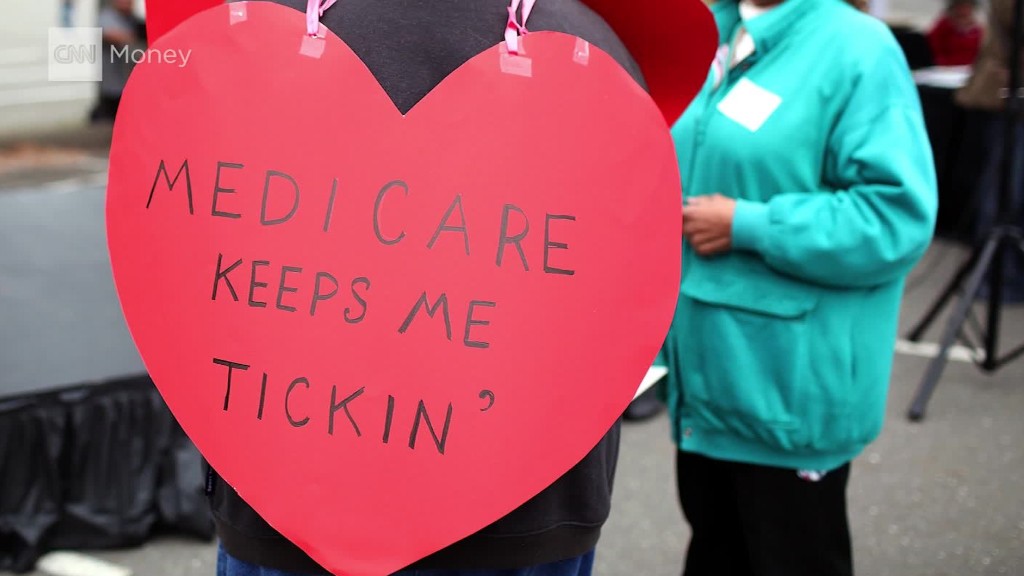
Count Saudi Arabia among the believers in Donald Trump's ability to make America grow again.
Saudi Arabia is downplaying the need for OPEC to make good on its promise to cut oil production at Wednesday's meeting in Vienna. That promise was originally made in September, back when President-elect Trump was still a long shot to win the White House.
But Khalid al-Falih, the Saudi energy minister, on Sunday said there will be more thirst for oil in 2017 and oil prices will stabilize without OPEC intervention.
"I don't think that we have one path only in OPEC meetings," Falih said, according to a Saudi newspaper.
"Maintaining production is justifiable, taking into consideration the recovery of consumption and growth in developing markets and the United States," he said.
While Falih didn't name Trump specifically, his comments suggest Saudi Arabia has faith in the new administration's ability to unleash U.S. economic growth -- and thus demand for oil. Trump has called for stimulating the American economy by slashing taxes and ramping up infrastructure spending on roads, bridges and airports.
Trump has also promised to make life easier on the fossil fuel industry by cutting red tape. That could include weakening EPA fuel efficiency standards and other regulations that have curbed demand for gasoline (and thus oil).
Related: Donald Trump is a double-edged sword for oil
Saudi Arabia's optimism in U.S. demand for oil stands in contrast with more conservative forecasts from independent analysts. As of Election Day, the U.S. Energy Information Administration was calling for motor gasoline consumption to inch up 0.5% in 2017. That's hardly the kind of boom in demand that would take pressure off OPEC.
The EIA also predicted U.S. petroleum and other liquids consumption will rise 1.3% next year to 19.9 million barrels per day. Again, not a huge uptick there. (The EIA is set to release its first post-election short-term outlook next week.)
Michael Block, chief market strategist at Rhino Trading, said the Saudi comments are the latest sign of over-exuberance in the markets about the power of Trump's stimulus plans.
"Apparently Steve Bannon has worked his hypnotic magic on our pals in Riyadh," Block joked in a note, referring to Trump's chief strategist.
"There you have it. We don't need production deals or trade deals because reflation and stimulus are going to push demand and everyone wins. All I need to do is snap my fingers," Block wrote.
The Saudi optimism in U.S. oil demand is also noteworthy given Trump's previous threat to cut off American purchases of Saudi oil. Trump said in March he might halt imports of oil from Saudi Arabia and other Arab countries if they didn't commit ground troops to fight ISIS or at least reimburse the U.S.
Falih has since warned Trump against this idea, saying it could backfire.
"At his heart, President-elect Trump will see the benefits and I think the oil industry will also be advising him accordingly that blocking trade in any product is not healthy," Falih told the Financial Times.
Related: Saudi Arabia warns Trump against banning oil imports
The Saudis may also be trying to brace the markets in case OPEC infighting scuttles a deal. The cartel reached a preliminary agreement in September for what would have been the first production cut in two years.
But turning that into a concrete deal has proved difficult. While the Saudis have signaled a willingness to cut output, the kingdom doesn't want to bear the pain alone. Yet Iran and Iraq have been more resistant to dialing back production. Iran in particular doesn't want to make any cuts before it fully recovers from sanctions.
Oil prices jumped more than 2% above $47.25 a barrel on Monday amid hopes that a deal will eventually be reached.
"Some OPEC agreement would presumably prevent a repeat of the collapse in oil prices that has followed some previous OPEC get-togethers," David Kelly, chief global strategist at JPMorgan Funds, wrote in a note.


